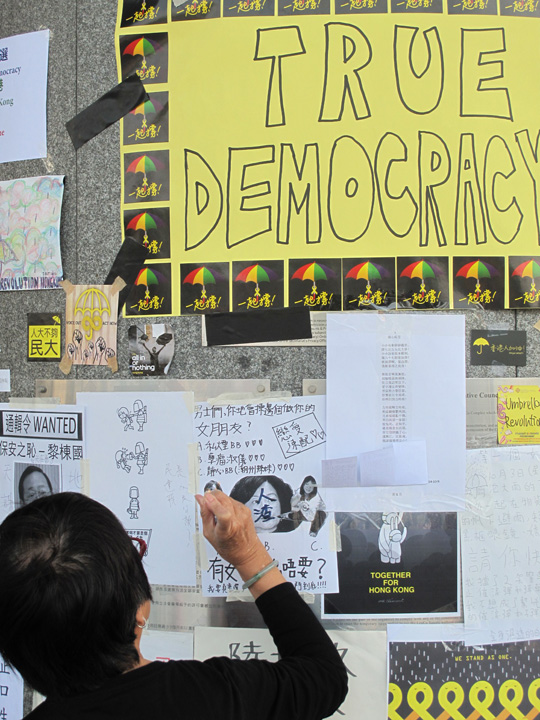Hong Kong’s last Occupy site, in Causeway Bay, on this otherwise cheerful Monday morning 15 December, was the focus of attention of the remaining occupiers, the police and the public plus a bevy of cleaners waiting in the wings.
Under a non-cooperation plan, Hongkongers were urged to express their displeasure with the government by splitting their tax payments into small sums. Tenants of public housing flats are being urged to delay paying their monthly rent until the last possible moment.
The groups are saying that salaries tax and rent were chosen as targets because they were unhappy that the government was spending taxpayers’ money on “white elephant infrastructure projects” and land policies that only benefited developers.
During the clearance 20 were arrested – including a 90 year old by now affectionately called ‘Uncle Wong’. On the other end of the age scale 18 year old Otto Ng, who said to international media, “…we still have not got what we wanted… but it has awakened the people of Hong Kong.” This has brought the grand total up to near 1,000 arrested over these 80 days.
A side issue but really something very close to what this protest had been leading to which is the problem of the great divide between those well off under the present system and those who are losing sight of any change in the future that will haul them out of despondency, is pointed out on HongWrong blog in a photo montage titled: Occupy Clear-out: The Most Thankless Task – see http://hongwrong.com/cleaners/ …the cleaners are the forgotten army that will ‘attend to the leftovers’.
Full low-down on the Occupy Admiralty eviction here: http://hongwrong.com/occupy-admiralty-eviction/
By far, the most thankless task of the Occupy camp clear-out operation was that of the clean-up crew. Street sweepers from the Food and Environmental Hygiene Department worked long into the night to remove debris from the highway and pavements around Admiralty.
In September, Jennifer Ngo of the South China Morning Post (SCMP) first reported on how long-suffering government street cleaners are deprived of basic employment rights.
Almost 75% of Hong Kong’s street cleaning is undertaken by five outsourced contractors who employ people on two-year rolling contracts. As government contracts are renewed every two years, workers find that their contracts are interrupted. They therefore lose out on sick leave, MPF retirement benefits and paid leave.
The reporter told how one elderly cleaner earns just HK$7,500 per month (about double the wages of a domestic helper) working eight-and-a-half hours a day. She is forced to supplement her income by collecting cardboard for recycling.
Thus, if there is any group that would benefit from better political representation, it would be the army of people who keep the city’s streets clean. Because, if the elites continue playing musical chairs with all the top positions of Hong Kong, any economic or social benefits that better the conditions of Hong Kong’s poorer sectors will be a long time coming. These are the people who are representing this territory but all they do is big money deals that eventually line their own pockets.
So this one example, of caring for the street cleaners, shows how far the activists involved in the Umbrella movement have moved their thinking from the early days when there was a near knee-jerk call for the resignation of the chief executive. This followed the release of a White Paper by Beijing that caused Hongkongers to question just what had C. Y. Leung informed the mainland China government when his administration submitted their Hong Kong report supposedly reflecting Hongkonger’s feeling and thoughts which could guide Beijing’s dictates on electoral reforms and the election format for Hong Kong.
It’s not wanting absolute democracy from Beijing but more choice in the possible candidates that would stand of election as the next chief executive. Even reverting from that White Paper’s determination which effectively tightened Beijing’s grip on Hong Kong to what stood before when one proper democrat did manage to get on the candidate list.
It remains to be seen what penalties are given to those arrested under the police clearance operations. One of those arrested, well known media tycoon Jimmy Lai Chee-ying has resigned from his top positions at Next Media, reportedly readying for any outcome of the immanent arrest as one of the occupying core group – and Occupy financier.
Those who too readily decry Beijing’s presumed heavy handed approach and the term ‘presumed’ in operative here, must bear in mind the usual subversion tactics of all those governments that see themselves as against China’s looming success and clear regional dominance which appears unstoppable. Funds came to the Occupiers from very suspect sources, under the name of supporting democracy, sadly, just as with calls for human rights, the hidden agenda is not so hidden.
Extreme capitalism, corporations, banks, insurers, military and war supplies all fit together and will not give up their powers and niche bases of operations and this negatively affects the quality of life of everyone. This is seen greatly in Europe now but it needs a more careful look at how this affects Asia – because Asians are used to living more on the edge. Thus the call by the students for people to “Wake Up”.
We’ll be back is the slogan but that need not mean on the streets but is much more likely in another form, less tangible, more ‘under-the-door’ but hopefully sticking to that principle of non-violence that has been so well displayed in these last moment of Phase One.










